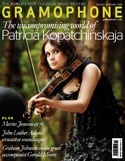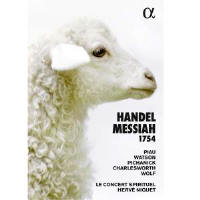Texte paru dans: / Appeared in: |
|
|
Outil de traduction (Très approximatif) |
|
|
Reviewer: David
Vickers
Rupert Charlesworth’s unforced
fluency fused with the lightly relaxed orchestra in ‘Ev’ry valley’ is top-notch.
Sandrine Piau and the Le Concert Spirituel’s strings integrate solemnity and
furore together to striking effect when conveying the refiner’s fire (‘But who
may abide’), with vocal embellishments that thrill while never forsaking sense
and taste. Niquet’s conducting of key moments such as ‘For unto us a child is
born’ have quick momentum and yet are also relaxed and graceful. The trumpets
are at an ideal distance in ‘Glory to God’, during which the overriding
impression from the excellent choir is the importance of ‘peace on earth’.
Katherine Watson’s nonchalant ‘Rejoice greatly’ is sung flawlessly, but the
breathless pace of ‘He shall feed his flock’ (shared between Piau and Watson)
lacks enough space to convey its consoling message. The opening stages of Part 2
are especially diminished by impatience: ‘Behold the Lamb of God’ lacks
sufficient gravity for its solemn message, and a rushed ‘He was despised’
severely limits the scope for Anthea Pichanick to mine its sentimental
treasures; the manic pace of ‘He trusted in God’ is aligned to eccentric
whispered choral singing and feather-like strings. The choral singing in ‘Lift
up your heads’ and ‘Let all the angels of God’ is softly compassionate, and the
doleful unaccompanied passages in ‘Since by man came death’ are powerfully
fulsome. Andreas Wolf’s open-throated proclamation of ‘The trumpet shall sound’
is accompanied by broad bowed strings and Jean-François Madeuf’s regal natural
trumpet (Niquet performs only the first section, whereas Handel always performed
it in full). There are a few moments of mercurial whimsy, such as convoluted
drone bass and pungent oboes punching throughout the Pifa, contrived harpsichord
solo embellishments over the closing bars of ‘Glory to God’ and an absurd
timpani solo prior to the oratorio’s final cadences. Nevertheless, Niquet’s
high-wire interpretation is commendably inquisitive and often surprisingly
intimate. |
|




